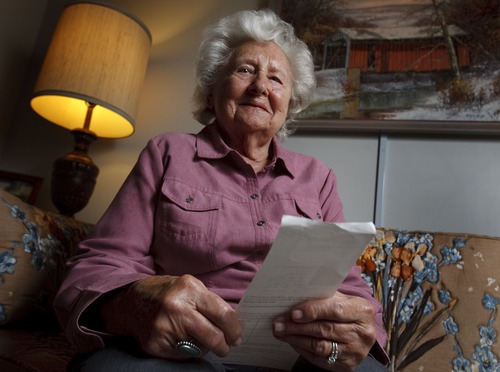This is an archived article that was published on sltrib.com in 2013, and information in the article may be outdated. It is provided only for personal research purposes and may not be reprinted.
Papers, please • It's hard to be more American than Renate McKitrick. The 90-year-old Utah resident came to this land of immigrants at the age of 2 from East Prussia (a country that doesn't even exist anymore), became a naturalized citizen in 1946 and has never given anyone any cause to doubt her loyalty. Except that the Utah Department of Motor Vehicles won't renew her state ID card, which she needs to buy medicine, vote and other important stuff, because she doesn't have the proper paperwork on hand. The documentation the state is now demanding may be available, if everyone waits two months for federal officials to excavate it from storage in a limestone cave in Missouri. Individual officials, at the state and federal levels, have been helpful, McKitrick says, and it looks like it will all be sorted out in the end. Still, this is no way to treat an American.
Medicine costs • For the first time in the 58 years that such things have been counted, the amount of money that Americans spent on prescription medications last year declined over the year before. It might sound like good news and, to some degree, it is. Americans are reaping the benefit of new waves of less expensive generic versions of treatments for such long-term conditions as high cholesterol or high blood pressure. And the cold and flu season was relatively mild. But the IMS Institute for Heathcare Informatics also reports that many people are spending less on medicines because they just aren't taking the pills they should be. The ongoing financial woes have left many people jobless, or without health insurance, and many of those still covered have policies with higher deductibles and co-pays that leave households skimping on many important things. Even medicine. Which is why healthcare reform, by any means you may prefer, has a long way to go.
Money back • It just keeps getting worse for the West Valley City Police Department. Not only is the constabulary in the state's second-largest city dealing with the woes of suspended officers and dropped criminal charges resulting from a very troubled drug squad. Not only is it under widespread criticism for never figuring out what happened to still-missing wife and mother Susan Powell. Now it has been forced to repay some $17,000 in federal grant money that was supposed to go to investigating drug trafficking because it went instead to, well, searching for Susan Powell. A federal audit said the money wasn't wasted, it just went for something that didn't meet the grant's criteria.



